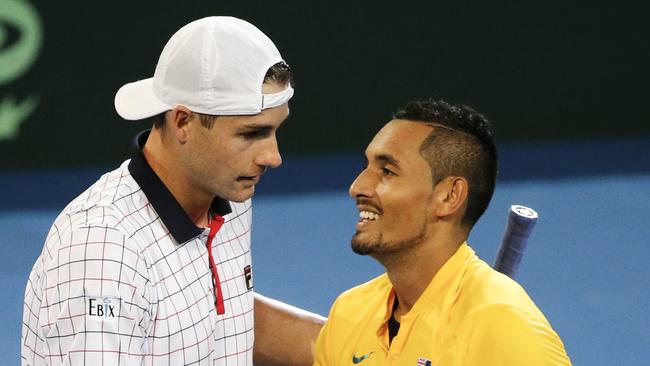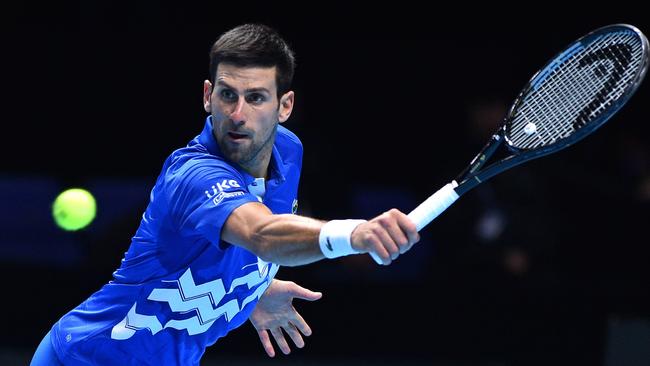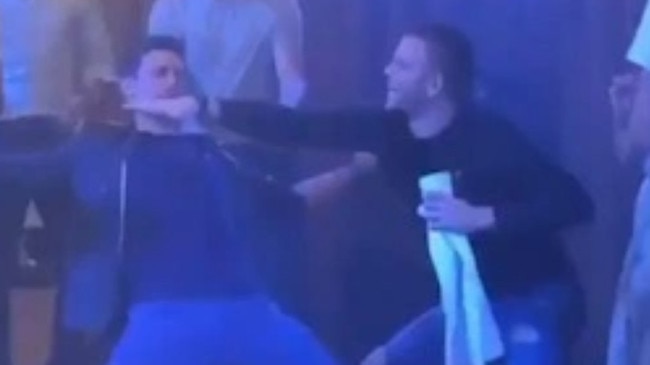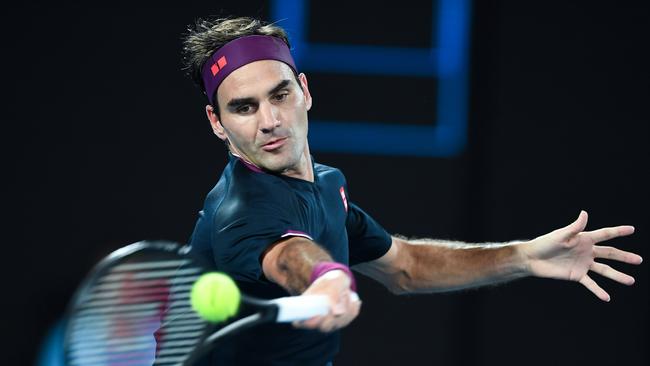Australian Open 2021: John Isner joins Roger Federer in skipping grand slam
Another big name has pulled the pin on contesting this year’s Australian Open due to the enforced quarantine rules.
Tennis
Don't miss out on the headlines from Tennis. Followed categories will be added to My News.
Another big name has pulled the pin on contesting this year’s Australian Open.
Big serving American giant John Isner will not be travelling to Australia saying he is not comfortable being away from his family for such an extended period of time.
Enforced quarantine has added a minimum of two weeks to time players will be away from home and Isner was not prepared to forces his loved ones into isolation.
“I’m staying home,” he said. “At this stage of my career and in my life I’ve always had visions of being able to travel with my family. ... It really was just a situation where I didn’t want to be away from my family for that long.
“I made this decision last night,” Isner said after losing to Sebastian Korda in Delray Beach. “It wasn’t an easy decision at all. I thought long and hard about it. But I feel comfortable with my decision right now and looking forward to getting home.”
Isner is the second top 30 player to withdraw from this year’s edition of the tournament with Roger Federer the most notable absentee.
“Roger has decided not to play the 2021 Australian Open. He has made strong progress in the last couple of months with his knee and his fitness,” Federer’s long-term representative said in December.

“However, after consultation with his team, he decided that the best decision for him in the long run is to return to competitive tennis after the Australian Open.
“I will start discussions this coming week for tournaments that begin in late February and then start to build a schedule for the rest of the year.”
The 39-year-old had two rounds of knee surgery last year and has not played since his semi-final defeat to Novak Djokovic at the Australian Open 12 months ago.
“The problem is that Mirka (Federer’s wife) and their children couldn’t leave the room,” Tennis Australia’s head of player liaisons Andre Sa told Brazilian media.
“They would have to stay 14 days in the room. The exception is only for players.”
COVID restrictions has made other players rethink their plans and preparations.
Defending champion Sofia Kenin admitted it was “not the most ideal situation”. “It is what it is. The rules are quite harsh, but it’s for everyone,” she said.
There is also the threat of sanctions, including hefty fines, spending additional time in quarantine or deportation, if the rules are broken.
Ukrainian world number five Elina Svitolina hired a mental coach in an effort to cope with the stress and uncertainty.
“I think during the difficult time right now, mentally it’s very important to stay strong, to stay fresh,” she said.
BUBBLE BREACHES COULD SEE PLAYERS DEPORTED
Stuart Fraser, The Times
They call the Australian Open the “Happy Slam”. But as the residents of Melbourne prepare for an influx of 1,270 people over the course of 48 hours this weekend, there appears to be little excitement after all that the city has done to contain successfully the spread of COVID-19.
It is no exaggeration to say that this is one of the most significant moments for Australia since a pandemic was declared by the World Health Organisation last March.
It is one thing allowing the India cricket team entry to the country for a Test series, but another of potentially grave consequences opening the borders for so many tennis players, coaches and staff from more than 100 countries.
Anxiety over the possible risks has been evident in recent weeks. Whether it be letters of concern to national newspapers or angry replies to posts on the Australian Open’s Twitter account, several members of the public have made abundantly clear their feelings that the tournament should not be taking place.

Bear in mind that the discipline and patience of the general population in the state of Victoria to follow a strict three-month lockdown resulted in a subsequent 61-day period without community transmission of the virus.
This, then, makes it all the more impressive that organisers have somehow persuaded the necessary national and local authorities to grant permission for the event to go ahead, albeit delayed by three weeks to a start date of February 8 to allow more time for the many complex logistical issues to be solved. A series of strict health protocols is in place, including a 14-day period of quarantine for all who arrive this weekend, but the sudden changeable nature of the pandemic has already threatened to derail the plans on several occasions.
“One thing that we have all learnt is that every single day you wake up there is a different set of issues,” Craig Tiley, the Australian Open tournament director, told The Tennis Channel.

DJOKOVIC ALMOST RUINED IT FOR EVERYONE
Sources have told The Times that one particularly difficult problem was the behaviour of several male players last year.
The scenes from Novak Djokovic’s now infamous Adria Tour in June, when players were filmed dancing topless in a Belgrade cabaret club, and the decision by Sam Querrey to flee Russia by private jet after testing positive did not exactly instil confidence during negotiations with Australian government officials that the rules would be followed by all.
By the skin of their teeth, though, the hard-working organising team at Tennis Australia have worked round the clock to put together a detailed proposal that authorities could sign off. Replies at 4am Melbourne time to recent queries from The Times give an indication of the lack of sleep for some members of staff.

SANCTIONS ARE FIERCE
To deter any breaches of COVID-19 protocols, the potential punishments are fierce.
Anyone who leaves quarantine without permission could be liable for a fine of up to $19,000 and additional criminal sanctions.
Rule-breakers could also face disqualification, forfeiture of prize money, extended quarantine, arrest and even deportation, which could potentially affect an individual’s ability to re-enter Australia in future years.
Crucially, players have also been told that “any breach by your team will be considered as a breach by you”.
This zero tolerance approach will begin when players board one of the 18 charter flights leaving from seven different cities - Abu Dhabi, Antalya, Doha, Dubai, Los Angeles, Miami and Singapore - later this week. The arrival into Melbourne will be under police guard, with shuttle buses travelling directly to the designated hotels.
For 14 days, players will be allowed out of their room for no more than five hours a day to train at Melbourne Park - something that was not of any appeal to Roger Federer, who pulled out two weeks ago citing this as a key factor.
MASSIVE FINANCIAL BURDEN
The complex biosecure operation is understood to be costing Tennis Australia more than $35 million. A financial hit in ticket revenue will also be suffered, with spectator capacity reduced to somewhere between 50 and 75 per cent at a site that will be split into three zones to limit contact and help tracing efforts should a positive case be recorded.
“We’re running a multimillion-dollar operational loss to make this work for the players,” Tiley said. “We are going to go into debt as an organisation, but we are doing that because we think it is the right thing for momentum, the right thing for the sport, and we are confident about what we can do in the future to correct that.”
Despite the remarkable efforts by Tennis Australia, some players still remain unhappy. The decision to allow six top players, including Novak Djokovic, Rafael Nadal and Serena Williams, to quarantine in Adelaide and play an exhibition event on January 29, has not been well received by some of the rank and file.

Organisers say this was necessary because the limit of people in quarantine in Melbourne had been reached, but it has not gone unnoticed that the restrictions in Adelaide are not quite as strict.
“They will be able to benefit from a gym at the hotel and will be able to do their exercises, which will not count towards the five-hour quota,” Jeremy Chardy, the world No 72 from France, told L’Equipe.
“Already they [top players] have a lot of privileges. If they can do more than you, it will not be the same preparation. And that’s weird for a sport where we’re all supposed to be on the same footing.”
One notable absence will be Rod Laver, the 11-times grand-slam champion, who, at the age of 82, has decided to remain in California rather than take up his usual front-row seat in the arena that bears his name. Like many, he will watch from home next month, intrigued to see if organisers can pull off what some figures within the sport, as recently as a few weeks ago, privately thought to be the impossible.
“The bottom line is that we are going to do the best we can to deliver an Australian Open that is close to what it was in 2020,” Tiley said.
“We hope that folks around the world will get to watch some great tennis. We all feel buoyed and confident about what we can pull off during a pandemic. I think we’re going to be turning the corner on this thing, but unfortunately we’re right in the sweet spot just now.”
Originally published on The Times
More Coverage
Originally published as Australian Open 2021: John Isner joins Roger Federer in skipping grand slam




